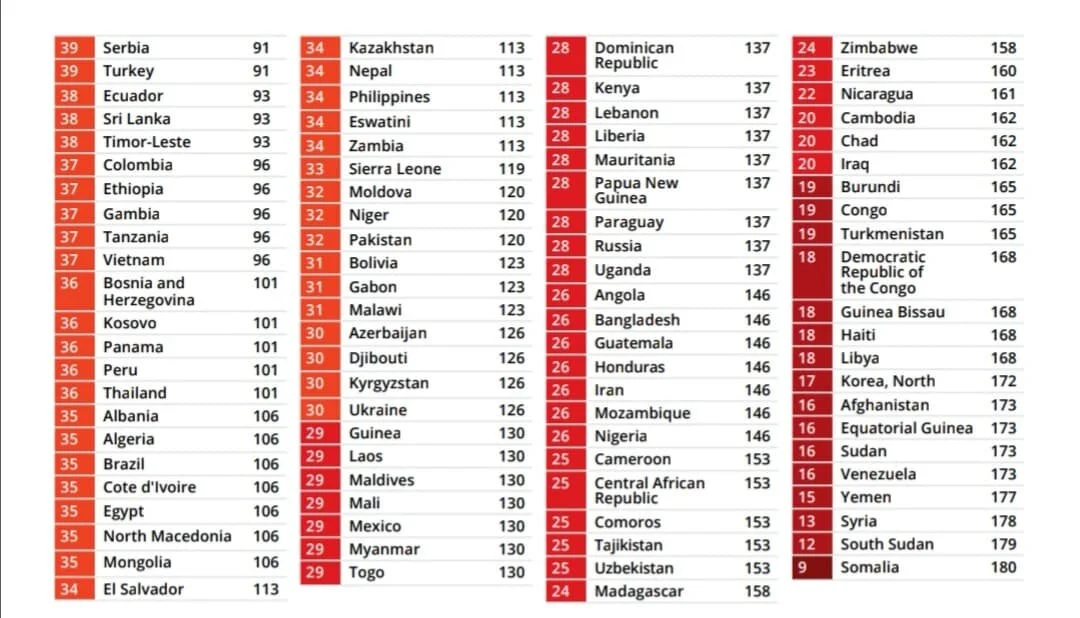As every year, the NGO Transparency International publishes its ranking of the corruption perception index (CPI), considered as the main global indicator of the level of corruption in the public sector. This year Portugal sees its ranking dropped both globally and at the European level. According to Transparency International, problems of conflicts of interest, the usurpation of state resources for electoral purposes, insufficient disclosure of the funding of political parties and campaigns and the lack of independence of the media remain common. Lisbob, the expatriate assistant in Portugal, tells you all about this global ranking of corruption.
Article translated from Dnoticias.pt
Corruption : Portugal sinks into world ranking
In 2019, Portugal worsened its score in the ranking on the levels of corruption in the public sector prepared by the non-governmental organization Transparency International (TI) and published today, but remains in the middle of the Union table European (EU).
According to information published today, Portugal now has 62 points (out of a possible 100) in the Corruption Perceptions Index (CPI), a ranking published annually by TI which is considered the main global indicator of levels of public sector corruption in each country.
This means a slight deterioration in Portugal's score, which was 64 in 2018. The higher the score, the less the country is corrupt.
In 2017, Portugal had a score of 63 points and was in 29th position.
In 2019, the country dropped to 30th place among the 180 considered in the annual ranking, thus maintaining the position of 2018.
Portugal is still two points below the EU average, which is now 64 points, but 19 points above the world average, which remains at 43 points, compared to 2018.
Considering only the EU, Portugal is the 13th member state with the least corruption among the 28 (the United Kingdom is still in the data, despite the “Brexit”), thus being in the middle of the table. The TI report does not mention specific cases of corruption in Portugal.
The Member States considered to be the least corrupt are Denmark (87 points), Finland (86 points) and Sweden (85 points).
At the opposite extreme, there is more corruption in the public sector in Bulgaria (43 points), Romania (44 points) and Hungary (also 44 points).
In the report accompanying this ranking, Transparency International underlines that "despite the improvement", the EU "is not immune to corruption".
According to the organization, "the problems of conflicts of interest, the usurpation of state resources for electoral purposes, insufficient disclosure of the funding of political parties and campaigns and the lack of independence of the media remain currency common "in the EU.
Therefore, for TI, the fight against corruption must "be a priority" for national governments and for the European institutions.
In addition, "countries like Hungary, Poland and Romania have adopted measures that jeopardize judicial independence", underlines the non-governmental organization, considering that this type of reforms, which have already received severe criticism on the part of Brussels, "weaken the capacity [of the Member States] to resolve high-level corruption cases".
TI also draws attention to the case of Malta, which has already lost six points in this ranking since 2015, which now has 54.
Recalling the case of Daphne Caruana Galizia, the Maltese investigative journalist murdered three years ago, TI emphasizes that, "despite requests from Maltese citizens, family and the international community for the case to be resolved, the government continues to drag the case ".
For Transparency International, this case led to the “decline of Malta” in the “ranking”, which was also due to cases such as the Panama Papers, the collapse of a Maltese bank and the “gold” visa regimes, leading to today “the country is still mired in corruption”.
The IPC index rates 180 countries and territories based on the perceptions of experts and international organizations, from a total of 13 sources, using a scale of zero to 100 points, where zero means "high corruption" and 100 " high transparency ”.
More than two-thirds of the countries fell in the ranking
More than two-thirds of the countries fell in the ranking
More than two-thirds of the countries, as well as many of the world's most advanced economies, are stagnating or showing signs of declining in their efforts to fight corruption, reveals a report released today in Berlin, Germany.
According to the 2019 Corruption Perception Index (CPI) of the non-governmental organization Transparency International (TI), "an impressive number of countries are making little or no improvement in the fight against corruption".
The IPC analysis finds that "countries where elections and the funding of political parties are open to undue influence of personal interests are less able to fight corruption".
"Frustration with government corruption and lack of trust in institutions indicates the need for greater political integrity," said Delia Ferreira Rubio, president of the non-governmental organization Transparency International.
"Governments must urgently address the corrupt role of money in the funding of political parties and the undue influence it has on our political systems," added Ferreira Rubio.
The Corruption Perception Index ranks 180 countries and territories based on their perceived levels of corruption in the public sector, based on 13 expert reviews and surveys by business leaders.
The IPC uses a scale from zero to 100, where zero is very corrupt and 100 is very clean.
According to the CPI, more than two-thirds of the countries score below 50, with an average score of only 43.
Since 2012, only 22 countries have significantly improved their scores, including Estonia (74), Greece (48) and Guyana (40).
During the same period, 21 countries dropped their scores considerably - Australia (77), Canada (77) and Nicaragua (22).
In the remaining 137 countries, levels of corruption "show little or no change," says the IPC.
Denmark and New Zealand top the table with 87 points each, followed by Finland (86), Singapore (85), Sweden (85) and Switzerland (85).
Syria, South Sudan and Somalia, with scores of 13, 12 and 9, respectively, occupy the last places.
The index also reveals that four G7 countries scored lower than last year: Canada (77), the United Kingdom (77), France (69) and the United States (69) .
Germany and Japan recorded no improvement, while Italy gained a point.
In order to "reduce corruption and restore confidence in politics", Transparency International recommends that governments strengthen controls and accounts and promote the separation of powers; attack preferential treatment to ensure that budgets and public services are not dictated by personal relationships or biased private interests and control political funding to avoid excess money and political influence.
TI also advises on managing conflicts of interest, regulating lobbying activities, strengthening electoral integrity and preventing and punishing disinformation campaigns and empowering citizens and protecting activists, whistleblowers and journalists .
Transparency International is a Berlin-based non-governmental organization that has led the fight against corruption for over 25 years.



















